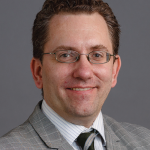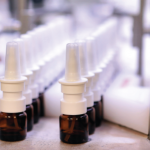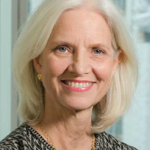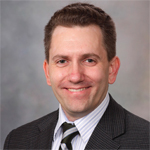As a clinical pharmacist at the Center of Rheumatology, she works with a smaller subset of medications than a pharmacist without that dedicated community of patients. “I can better know the ins and outs of the medications—for example, how long it will take to start working and what the side effects are.”
Her experience and expertise with medications help the physicians she works with make the best decisions for their patients. And the time she spends counseling patients frees the physicians’ time for other tasks.
Outpatient clinical pharmacists are an emerging population. Dr. Farrell says, “In 2008, there weren’t a lot of pharmacists in outpatient settings. Today, pharmacists aren’t recognized as providers for billing, so paying the pharmacist’s salary is hard.”
Jessica Farrell, PharmD, is the driving force behind the postgraduate program she recognized a need for— the first PGY-2 (postgraduate year two) pharmacy rheumatology residency.
One of her goals for the pharmacy rheumatology residency is to develop quality assurance programs with insurance companies, so reimbursement becomes possible.
New Director for Judith & Steward Colton Center for Autoimmunity
 Timothy Niewold, MD, is now the director of the Judith and Stewart Colton Center for Autoimmunity and the Judith and Stewart Colton professor of medicine at the New York University School of Medicine. Most recently, he was at the Mayo Clinic.
Timothy Niewold, MD, is now the director of the Judith and Stewart Colton Center for Autoimmunity and the Judith and Stewart Colton professor of medicine at the New York University School of Medicine. Most recently, he was at the Mayo Clinic.
Accepting the position was “an exciting opportunity. I couldn’t say no,” Dr. Niewold says.
His past work mapping the genetic factors that cause autoimmune diseases and exploring the ways genetic variations alter the human immune response to result in disease slips neatly into the Colton Center’s mission “to elucidate the initiating immunological events in autoimmunity and to develop new diagnostics and treatments for autoimmune diseases,” as stated on the center’s website.
The Colton Center is under the auspices of the medical department, rather than rheumatology, because it deals with other autoimmune diseases like irritable bowel syndrome and multiple sclerosis. “That’s attractive to me, because there might be commonality between [autoimmune diseases],” says Dr. Niewold. “There is one human immune system, so there could be crossover.” He believes research that reaches beyond the common silo mentality holds great promise.
Part of his job is managing the pilot grants the Colton Center awards to scientists to start research. “The pilot projects may plant seed money for autoimmune disease research and break new ground to move toward clinical care,” Dr. Niewold says. Translational research, mostly in immunology, is the name of the game at the Colton Center. “We work toward getting research plugged into the pipeline.” Other duties as director include mentoring fellows and junior faculty.
Timothy Niewold, MD, is now the director of the Judith & Stewart Colton Center for Autoimmunity & the Judith & Stewart Colton professor of medicine at the New York University School of Medicine.
Dr. Niewold is still running his own lab, having brought lots of lab members with him from the Mayo Clinic. With National Institutes of Health funding, the Niewold lab has investigated biomarkers of treatment response in rheumatoid arthritis patients, as well as the role of type I interferon in the development of lupus. His research led to his being awarded the 2015 Mary Betty Stevens Young Investigator Prize.



